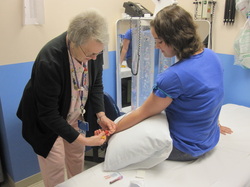
I feel lucky to have had great guidance in terms of late effects. I am part of the survivorship follow-up program at Johns Hopkins, so see my doctor there once a year. She follows my academic performance, physical abilities, and more.
This was immensely helpful during my first semester of freshman year (last year), when I found myself really struggling to finish my exams within the given time. I had never had any trouble academically, so didn’t really think about the fact that I could eventually have issues from the chemo and radiation I received. However, when I went to my survivorship appointment that winter, my doctor told me that it is quite common for survivors of many pediatric cancers to have cognitive trouble. Typically, issues arise in either ability to process information or with executive functioning skills (i.e. planning ahead and time management). She said it definitely seemed that I was having trouble processing information, so she helped me get in touch with Duke’s Office of Student Disabilities. Coming to Duke, I never even knew such a place existed, so it was very helpful to learn about that! Through that, I was able to get an accommodation for extra time on tests, and it has been extremely helpful! For those of you who, like me, find yourself in a bit of a chemo brain kind of fog once in a while, this is a really useful accommodation!
The doctors working in these survivorship programs are also very familiar with all the current survivorship research. This was useful to me when I was struggling to get back to a healthy weight after gaining a great deal from being on high-dose steroids during my treatment. My survivorship doctor was able to tell me about recent research that was showing Leukemia survivors can often have decreased metabolic function, so can have a harder time maintaining a healthy weight. Any issues like this that you find important can be better understood through such follow-up care.
For other young adult survivors, I strongly recommend becoming part of a survivorship program and to have such follow-up visits. I have found it so useful, even just to know, year after year, that you don’t have any significant problems.
Many major hospitals have long-term follow up services in their oncology clinics. You can also find some useful information about follow-up care after cancer on the NIH’s website at http://www.cancer.gov/cancertopics/factsheet/Therapy/followup
 RSS Feed
RSS Feed

